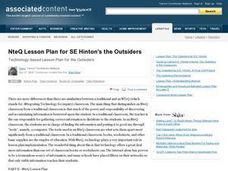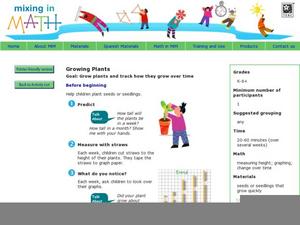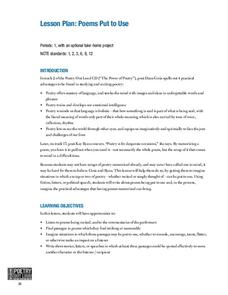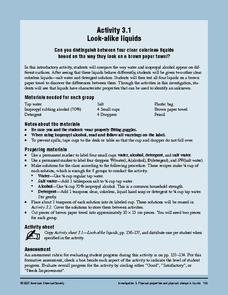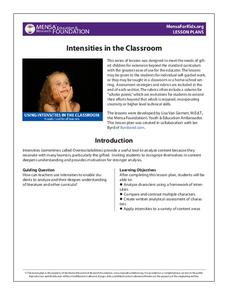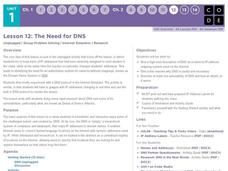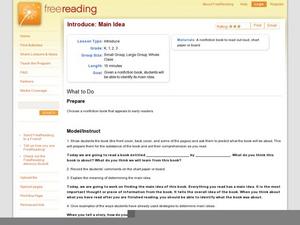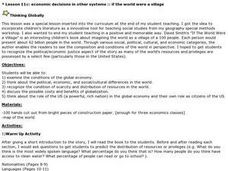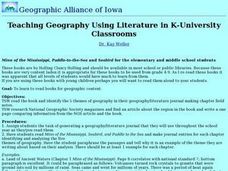Curated OER
Predicting Events in Realistic Fiction
How do you make a prediction? Practice active reading comprehension strategies, like making predictions, with your readers. Learners make predictions during the independent reading of Dogs Don't Tell Jokes by Louis Sacher. They observe...
Curated OER
Genre: Short Story
Discover the genre of short stories with sixth graders. They discuss the characteristics of short stories from the book America Street. Then, they compare and contrast movies and television shows and chart story characteristics. Various...
Curated OER
Fast Food and Daily Nutrition Choices
Students explore food. In this nutrition instructional activity, students investigate multiple facets of healthy eating and how the fast food industry impacts our society. They will participate in class discussions, read from their...
Curated OER
NteQ Lesson Plan for S.E. Hinton's The Outsiders
Explore literature through the completion of reading comprehension worksheets in class. After reading the classic book, The Outsiders by S.E. Hinton, middle schoolers review each chapter by completing study questions and story webs....
Mixing In Math
Mixing in Math: Growing Plants
Whether you have your class plant seeds or begin when sprouts are visible, math skills are used here to predict and track growth over time. Straw bar graphs show plant height on a given day while the graph as a whole shows changes over...
EngageNY
Close Reading of Thank You, Mr. Falker: Identifying the Superpowers of Reading
Third graders read excepts from the story, Thank You, Mr. Falker in order to gain practice in understanding an unfamiliar story by focusing on the details. They use a worksheet, embedded in the plan, which directs them to certain...
Poetry Out Loud
Poems Put to Use
Why do we have to study poetry? Here is a lesson that demonstrates some of poetry's more practical and real-world applications for reluctant learners. Start by leading a brainstorming session about where poems or pieces of poems might be...
Curated OER
What’s your Name?
Youngsters work to build empathy, cultural understanding, and a sense of self as they uncover the story behind their own names. They read the book, The Name Jar, discuss immigration and how it feels to be in a new place. Then, they...
AMCO
Clay Face Masks
Let your class explore their sculpting skills with a lesson on making clay masks. Each step in the process is fully described alongside a helpful image. Kids of any ages will be able to construct fantastic representations of the human...
EngageNY
Continued Close Reading of Bullfrog at Magnolia Circle: Text-Dependent Questions and Vivid Words and Phrases
In the third activity from this unit based on the book Bullfrog at Magnolia Circle, learners focus on using specific details from the text-to-answer questions about the habitat of bullfrogs. While reading the text, young scholars are...
Curated OER
5 Broken Cameras: How Storytellers Shape the Story
5 Broken Cameras, the award-winning documentary nominated for a 2013 Academy Award and winner of the Sundance 2012 Directors Award is the focus of a resource packet that includes a lesson plan, discussion guide, reading lists, background...
Consortium for Ocean Science Exploration and Engagement (COSEE)
Ocean Acidification: Whats and Hows
Open this lesson by demonstrating the production of acidic carbon dioxide gas by activated yeast. Emerging ecologists then experiment with seashells to discover the effect of ocean acidification on shelled marine organisms. They measure...
American Chemical Society
Look-Alike Liquids
Here is the first of four experiments to differentiate among unknown liquids by their behaviors and properties. Pupils observe how different liquids respond to being placed on plastic and paper, and they take notes about their...
Teacher Created Resources
A Guide for Using A Christmas Carol in the Classroom
The materials in this 48-page packet are designed to supplement a unit study of Charles Dickens' A Christmas Carol. Included are vocabulary lists and activities, discussion questions and quizzes, book report ideas, a bibliography of...
MENSA Education & Research Foundation
Intensities in the Classroom
Everyone learns and experiences life differently. A set of lessons about character intensities encourages middle and high schoolers to analyze themselves, their peers, and characters from a book based on the five listed intensities:...
Code.org
The Need for DNS
That's one complicated address book! To understand the need for a system that keeps track of addresses, pupils trying to find the IP address of their classmates. Then individuals change their IP addresses, which leads to research about...
Curated OER
Introduce: Main Idea
Begin exploring main idea in a text by telling the class an interesting story. Can they recall the main idea after you finish? What clues told them this was it? Explain that you will apply this concept as you read a nonfiction book....
Curated OER
Let's Learn About Patricia Polacco: An Author Study
Students participate in an author study about Patricia Polacco focusing on her use of family and friendship as themes in her books. They write a letter to the author and compare her life to that of Beatrix Potter. They examine how their...
Curated OER
Mixed Bags: Fiction and Nonfiction
The second in a series of three lessons from Scholastic comparing and contrasting fiction and nonfiction, this activity requires learners to read, write, and compare two books independently. After briefly reviewing the features of...
Curated OER
Dr. Seuss and Universal Themes
Discover some of the themes of Dr. Seuss's major books. They see that despite being written for young people, Dr. Seuss' books contain powerful messages and important themes.
Curated OER
If the World Were a Village...
Your class members explore concept that the world is a large place, examine how statistics can be used to help in understanding the world and its people, and create illustrations or graphs of statistics found in the award-winning...
Curated OER
Timeline of Historical Fiction
Students create a historical fiction timeline. They review the literature through the perspective of history (writing prompts provided). Students create a book cover illustration to appear with the book review in the appropriate spot on...
Curated OER
teaching Geography Using Literature in K-University Classrooms
Students read one of the following books: Minn of the Mississippi, Paddle-to-the-Sea, or Seabird, all by Holling C. Holling, and identify the five themes of geography as well as make a literature journal with chapter field notes. They...
Curated OER
The End?
This lesson asks young readers to predict what will happen to Harry Potter. While the question has been answered by the last book and film in the series, the concept and links provided by The New York Times’ Learning Network are...





